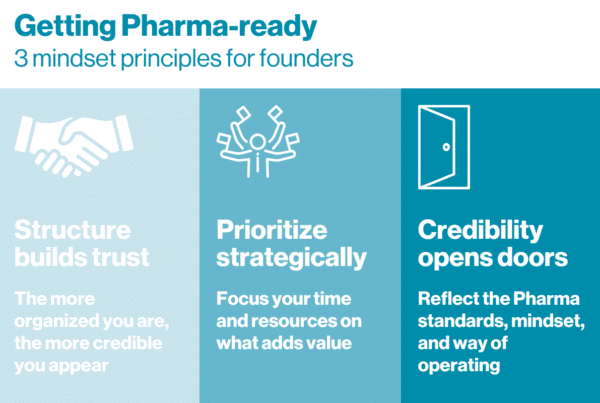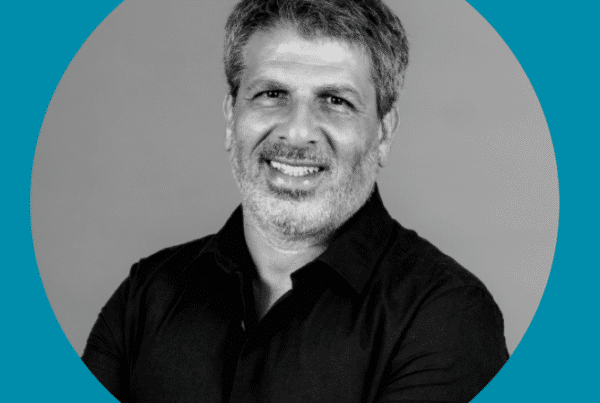We spoke with members of the DayOne team to get their insights on the rapidly evolving healthtech landscape. In this Q&A with Caoimhe Vallely-Gilroy, DayOne Director of Healthcare Strategy & Pharma, and Pascal Clisson, DayOne Business Growth & Strategic Partnership Lead, they share their perspectives on emerging industry trends, current investor sentiment, and what they are most excited to see in this year’s DayOne Accelerator program.

What emerging trends in healthtech are you most excited about, and how is DayOne positioning itself around them?
Caoimhe Vallely-Gilroy (CVG): What I find most exciting emerging in healthtech right now is the rise of predictive analytics – specifically in diagnostics and prognostics. It’s about using data to identify risks earlier, monitor potential health issues sooner, and enable timely interventions before conditions become critical. This shift supports a move toward preventative care through healthtech.
DayOne focuses on supporting high-impact startups working at the clinical level – especially those developing advanced monitoring, engagement and data collection tools. We provide a unique environment where these technologies can be validated in clinical trials, making us a key partner for startups operating at the intersection of healthtech and pharma in clinical development.
Pascal Clisson (PC): Another exciting trend is the rise of tech in the biotech space. We’re seeing an increasing number of companies offering real-world solutions, especially healthtech innovations powered by AI. These solutions aim to accelerate clinical trials, enhance patient engagement, and boost pharmaceutical research and development. This rapid growth in the sector makes us very enthusiastic about the new technologies emerging.
What are the major challenges or common pitfalls that you are seeing right now for healthtech startups?
CVG: One of the biggest challenges for healthtech startups operating at the pharma intersection is that pharma isn’t currently a stable investor in new technologies. Due to pipeline pressures, most pharma innovation budgets are directed toward drug development, not downstream solutions like clinical trial support or patient engagement tools.
Startups focused on molecule development or target identification are still in demand. But those offering solutions further down the value chain often struggle to secure pilots, let alone scale them. Without a strong drug pipeline, pharma has limited capacity to invest in broader healthtech innovations – even if they improve efficiency or patient outcomes. As someone working in this space, I see firsthand how hard it is just to get a foot in the door, let alone convert interest into sustained partnerships.
PC: A common oversight – and the reason the Day One program exists – is the misunderstanding of how the pharma industry operates. It’s crucial for startups to engage with pharma companies early on to grasp their logic and strategic approach. This helps avoid costly mistakes and saves valuable time. One of the biggest challenges is making collaboration between startups and pharma truly effective and finding the best ways to work together.
How has investor sentiment toward healthtech evolved in the past years, and what do you expect in the coming year?
CVG: Healthtech saw a major investment surge around 2020–2021, driven by hype around companies like Pear Therapeutics and Babylon. But when those didn’t deliver as expected, investor confidence dropped sharply. Now, investment is slowly returning – but it’s more cautious and targeted. Investors are looking for startups with clear, operational business cases and proven paths to implementation. It’s no longer enough to have great science; there needs to be a visible customer fit and real-world application.
PC: Healthtech investments have seen their ups and downs, with strong interest around AI and drug discovery from investors and industry. The real challenge lies in building successful startups that provide tech solutions for pharma and establish sustainable collaboration models. In biotech, pharma often acquires molecules through mergers and acquisitions to boost R&D, but in healthtech, partnerships are still mostly service-based rather than acquisition-driven. What’s needed is a clearer understanding of effective pathways and models for collaboration between startups and pharma.
What do you believe are healthtech investors’ biggest concerns at the moment?
PC: Everyone knows this digital transformation is coming, but no one knows exactly when or how it will unfold. There’s excitement from investors around these innovations, but the industry still needs to clearly demonstrate real value and a strong investment case. Without that, enthusiasm alone won’t be enough to sustain long-term growth. The biggest challenge right now is how long it will take the industry to adopt these new technologies that could make a truly significant impact.
CVG: Investors now want to ensure that what they back can become a viable commercial business and clearly meets the needs of its target industry. It’s no longer enough to have an innovative concept or promising science – startups must demonstrate a clear path to market, a validated business model, and strong alignment with real-world demand.
What are you most excited about for the DayOne Accelerator 2025 cohort?
PC: We’re really excited about receiving nearly 200 applications from around the world. The technologies span a wide range – from techbio and AI-driven drug discovery to diagnostics, digital biomarkers, patient identification and stratification tools, protocol optimization systems, remote monitoring, and more. Within the pharma R&D space, it’s clear there are many innovative solutions that can support and accelerate development and improve efficiency. We’re looking forward to seeing which technologies will emerge as the most impactful and relevant for the industry today.
CVG: I’m really excited about this year’s cohort – it’s the first time we’ve had such a clearly defined scope, and the result is a highly competitive, mature group of applicants. We’ve seen standout startups across the spectrum, from drug discovery to real-world evidence and clinical trial diversity.
Any advice for this year’s startups? And for the broader DayOne ecosystem?
CVG: My advice to startups is to not mistake a no-fee, no-equity accelerator for low effort or low value. You get out what you put in. We offer access to top-tier mentors, valuable connections, and peer learning – so the more you engage, the more you’ll gain. And it’s not just startups who need support – mentors and industry professionals can feel worn down by constant corporate “no’s.” Meanwhile, startups bring this infectious belief that anything is possible. Their energy is incredible.
PC: The Basel ecosystem is truly unique because of the many key players present. I’d strongly encourage startups to make the most of the program by connecting widely and gathering as much industry feedback as possible. This will help them refine their value proposition and tailor their pitch to the right focus areas. Additionally, finishing the program with our flagship Innovation Showcase offers a rare opportunity to meet many important people from the ecosystem in person – something that is incredibly valuable for startups.


